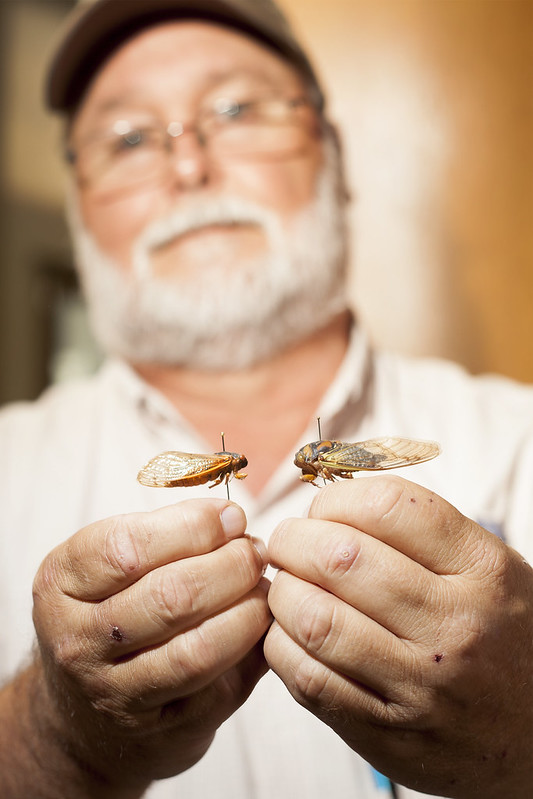May 28, 2021
While cicadas grab headlines east of the Mississippi, activity in Arkansas remains low
By Ryan McGeeney
U of A System Division of Agriculture
Fast Facts:
- No large broods expected to hatch in Arkansas this season
- “Dog day” cicadas hatch annually
- “Cicada killer” wasps native, harmless to humans
(358 words)
(Download this story in MS Word format here.)
LITTLE ROCK — To see, hear or read the national news, one could be forgiven for thinking cicadas were the new national pastime, or possibly an invading force.
And for some areas east of the Mississippi River, they nearly are. Brood X cicadas — millions upon millions of them — have emerged in more than a dozen eastern states after 17 years underground, the sounds of their mating calls nearly drowning out all else.
And yet, it is nearly all quiet, here on the Arkansas front. Emily McDermott, assistant professor of entomology and plant pathology for the University of Arkansas System Division of Agriculture, said it will likely remain that way for another few years.
“Unfortunately, we’ll have to wait a few more years for our next emergence of periodical cicadas here in Arkansas,” McDermott said.
She said Brood XIX cicadas, which emerge on a 13-year cycle, are expected in Northwest Arkansas in 2024. Brood XXIII, another set of periodical cicadas, emerged in Arkansas in 2015.
Arkansans can still expect to see (and hear) the annual cicadas known as “dog day” cicadas this summer, however. The species, which has a shorter life cycle of five to six weeks, emerge every summer, typically during the hottest days of the season. The Brood X cicadas, in contrast, typically live for 10 to 16 weeks.
“They won’t be quite as overwhelming as the periodical cicadas will be on the east coast, but people will still see them around,” McDermott said. “Unlike the black and yellow and red periodical cicadas, dog day cicadas will be mostly green with black markings.”
With the emergence of cicadas also comes large wasps, commonly known as “cicada killers.” These insects catch cicadas and feed them to their larvae, but tend not to bother with humans, McDermott said.
“Last summer, there were a lot of people who saw cicada killers and were concerned that they were the invasive Asian giant hornets that were all over the news,” she said. They are both large, intimidating, stinging insects, but we do not have the Asian giant hornet in Arkansas.”
Cicada killers are native insects, and Arkansans shouldn’t fear them, McDermott said.
To learn more about extension programs in Arkansas, contact your local Cooperative Extension Service agent or visit uaex.uada.edu. Follow us on Twitter at @AR_Extension.
About the Division of Agriculture
The University of Arkansas System Division of Agriculture’s mission is to strengthen agriculture, communities, and families by connecting trusted research to the adoption of best practices. Through the Agricultural Experiment Station and the Cooperative Extension Service, the Division of Agriculture conducts research and extension work within the nation’s historic land grant education system.
The Division of Agriculture is one of 20 entities within the University of Arkansas System. It has offices in all 75 counties in Arkansas and faculty on five system campuses.
Pursuant to 7 CFR § 15.3, the University of Arkansas System Division of Agriculture offers all its Extension and Research programs and services (including employment) without regard to race, color, sex, national origin, religion, age, disability, marital or veteran status, genetic information, sexual preference, pregnancy or any other legally protected status, and is an equal opportunity institution.
# # #
Media contact:
Ryan McGeeney
Communications Services
University of Arkansas System Division of Agriculture
Cooperative Extension Service
(501) 671-2120
rmcgeeney@uada.edu
